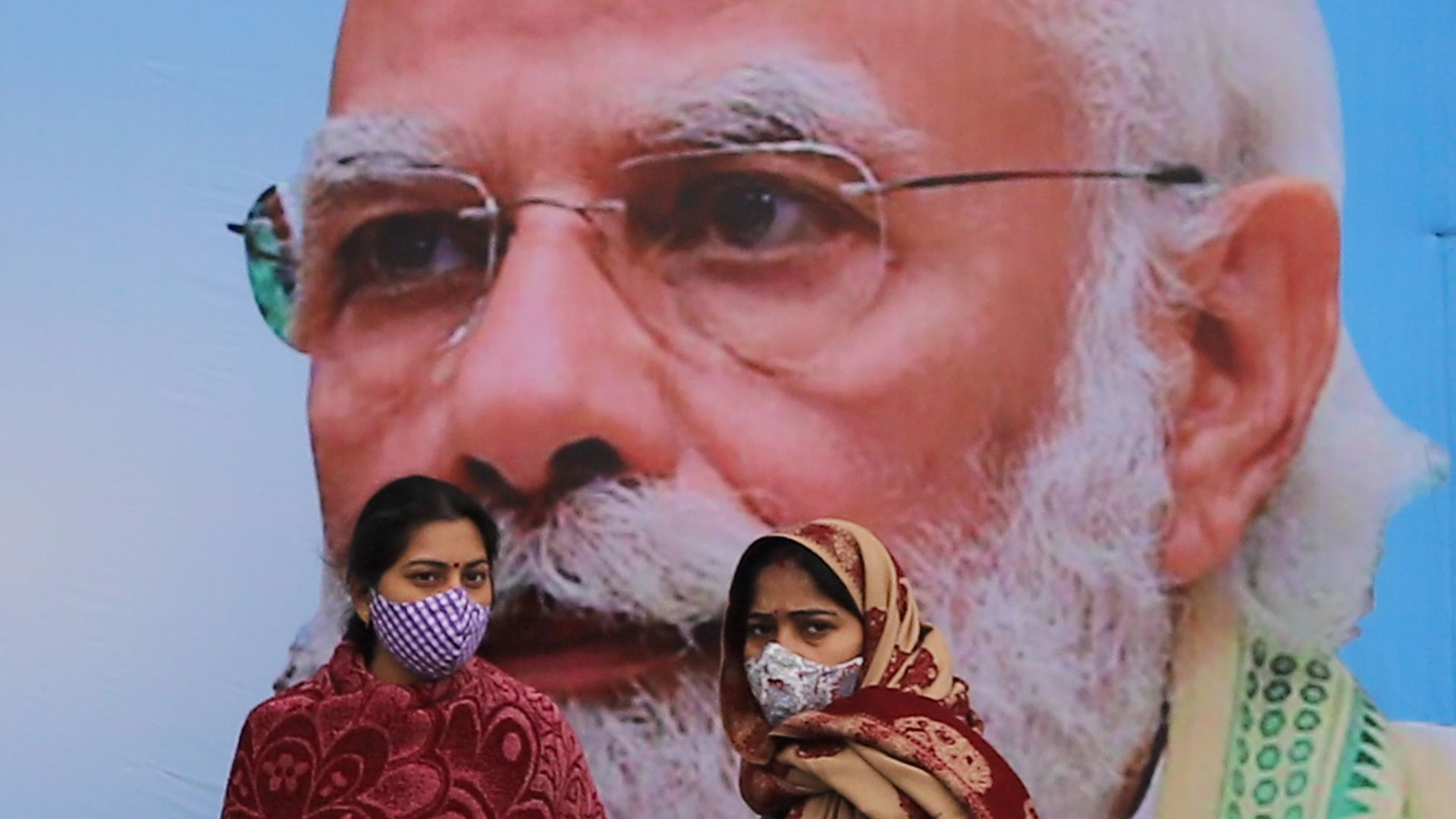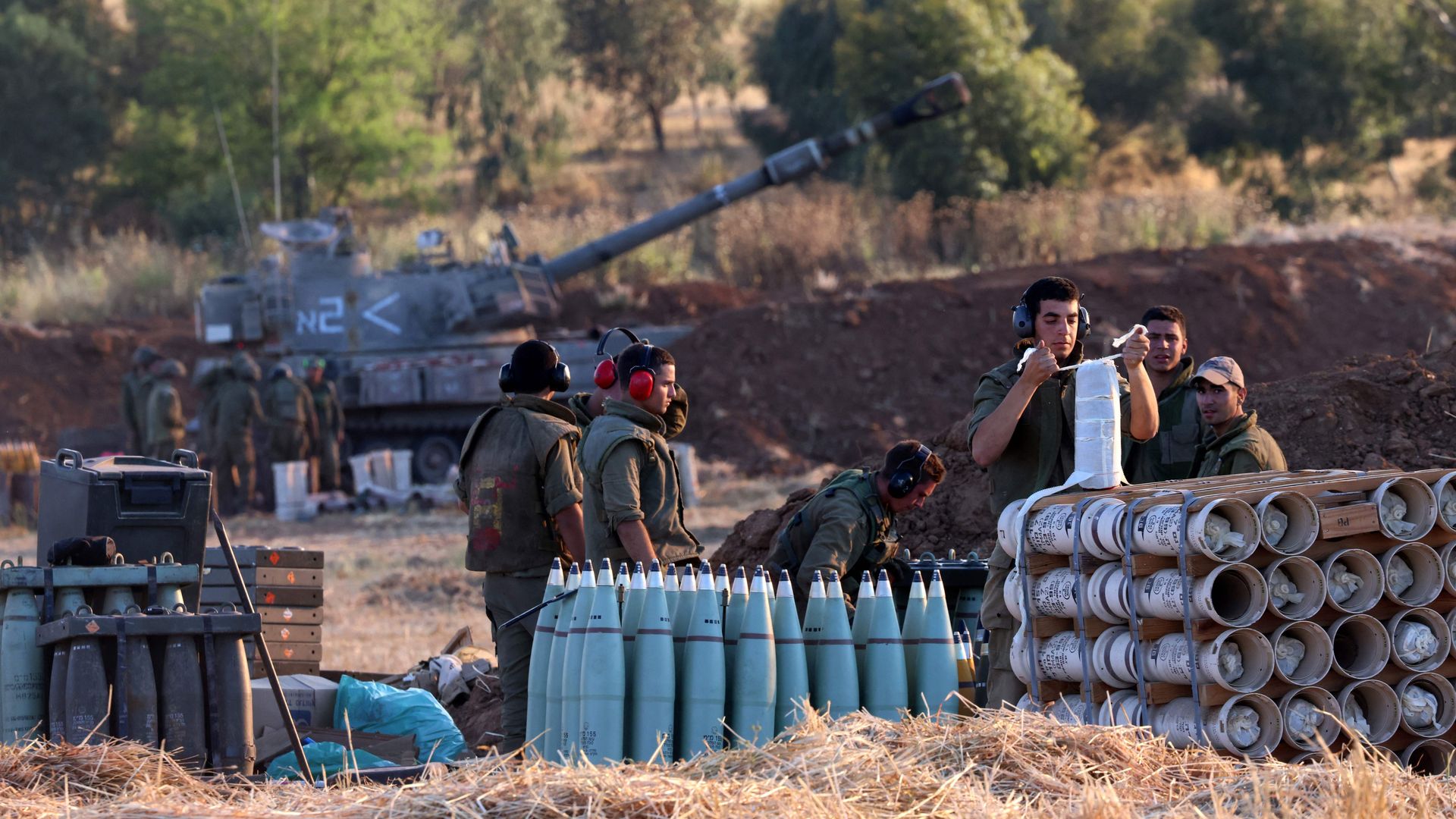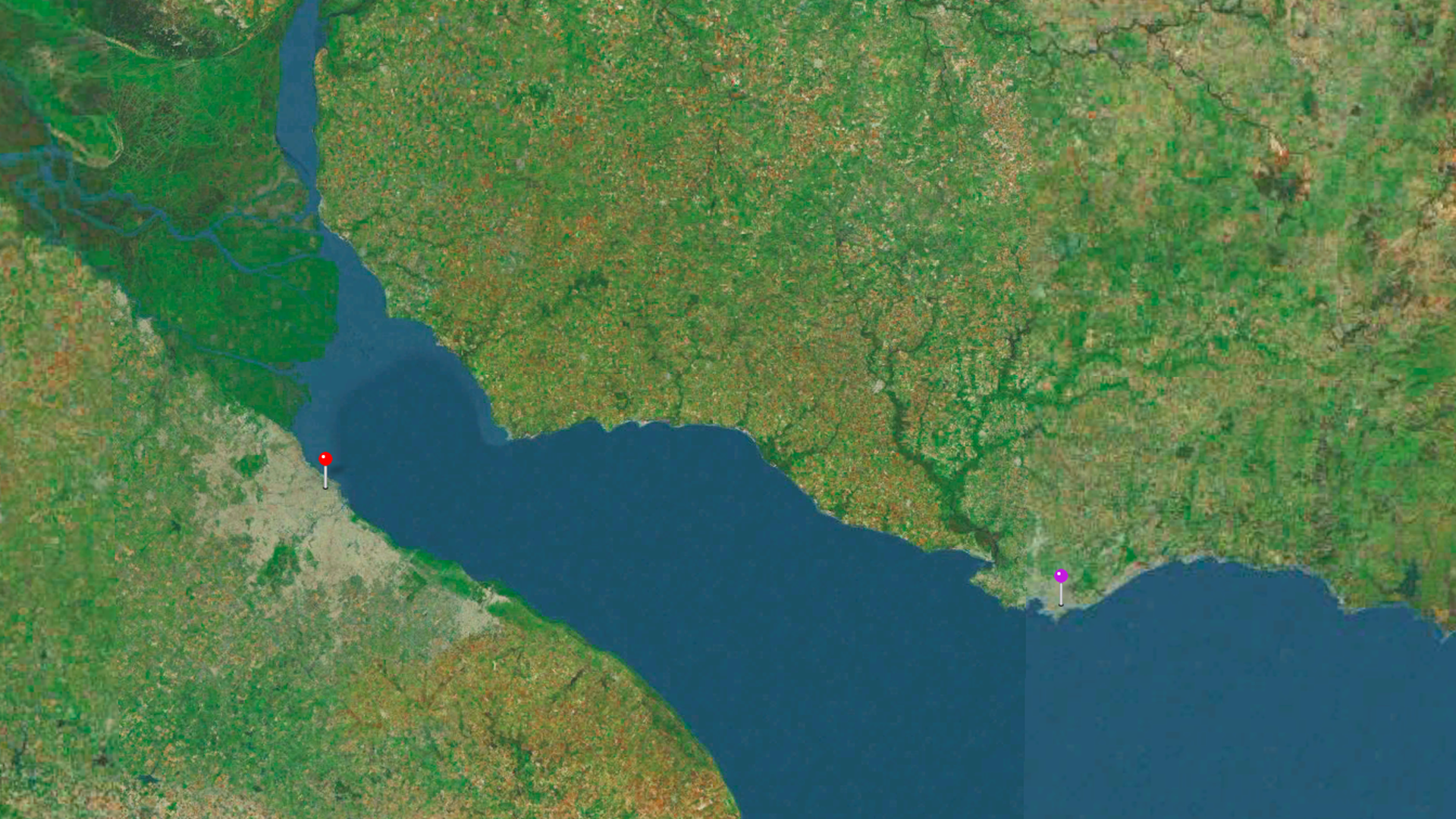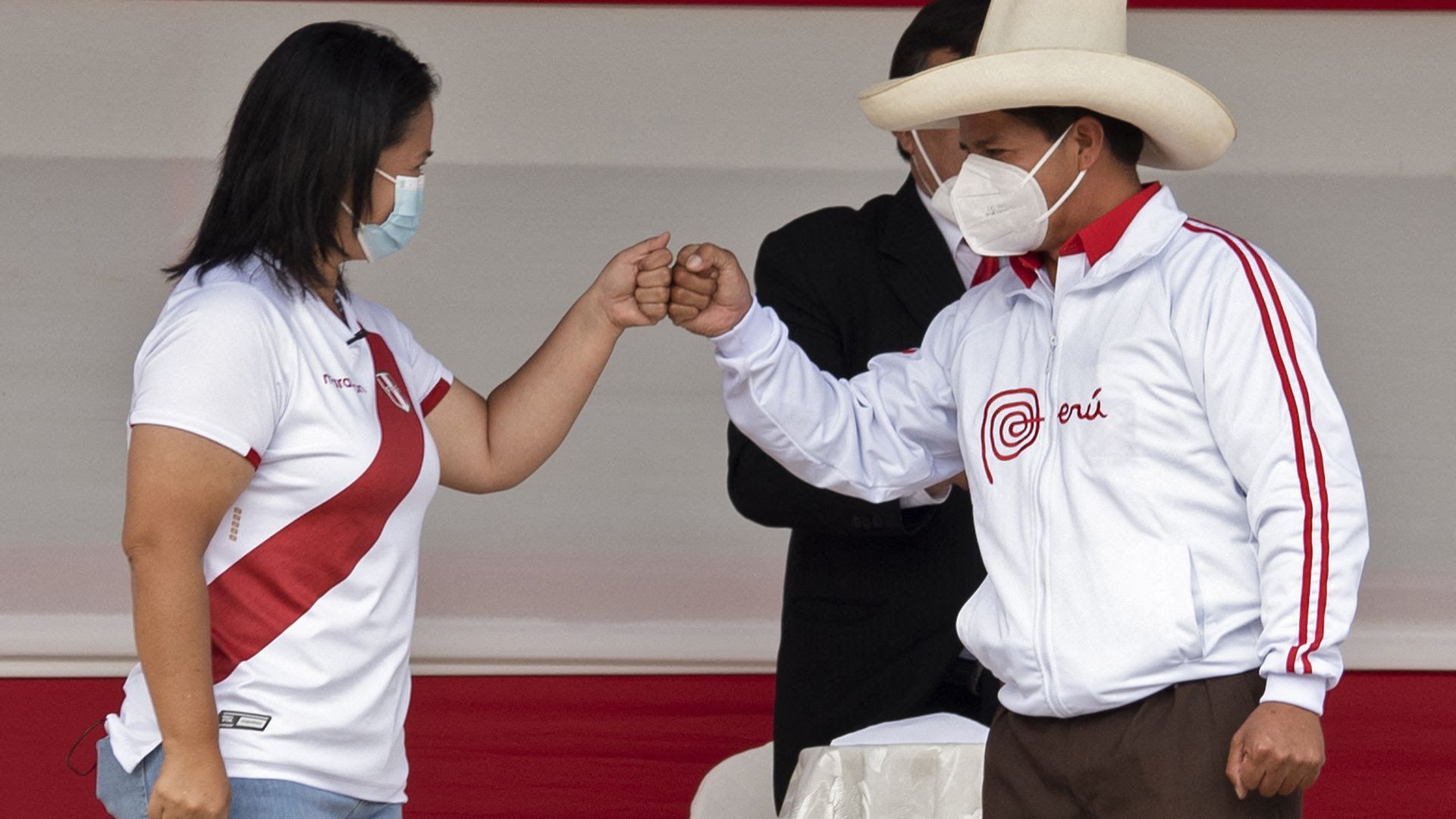| | | | | | | Presented By Malwarebytes Small Business Solutions | | | | Axios World | | By Dave Lawler ·May 13, 2021 | | Welcome back to Axios World. - We're starting tonight (1,675 words, 6 minutes) in India, with stops in Gaza and Peru.
- Tonight's geography game is tricky, but I hope you enjoy puzzling it out. Please keep spreading the word about this newsletter and subscribe if you're just joining us.
| | | | | | 1 big thing: Modi humbled by India's virus crisis |  | | | Still looming large, in New Delhi. Photo: Anindito Mukherjee/Bloomberg via Getty | | | | After mishandling the worst domestic crisis India has faced in decades, Prime Minister Narendra Modi's approval ratings have plummeted … to 63%. Breaking it down: While that's down from 74% before India's second wave struck, per Morning Consult's tracker, it still makes him perhaps the most popular leader of any major democracy. But despite his enduring popularity, Modi no longer appears invulnerable. "The palpable sense of outrage, of disgust really, with the government's handling of the pandemic is very real," particularly among middle-class Indians who form a key component of Modi's support, says Milan Vaishnav of the Carnegie Endowment. - And for a strongman leader who built his reputation on competence and bold decisions, Modi has been largely absent from the political stage as India has become the global epicenter of the pandemic.
- Senior officials in his Bharatiya Janata Party (BJP) have tried to deflect blame from the prime minister onto state governments, particularly those it doesn't control.
- But images of Modi addressing massive political rallies and allowing huge religious festivals to proceed as case numbers climbed are difficult to explain away.
Modi has two enduring advantages: A deep connection with ordinary Indians — linked in part to his "David vs. Goliath" personal narrative, Vaishnav says — and a fractured opposition. - Even as the BJP fell short of expectations in state elections last month, the "scattershot outcomes" of various regional parties securing victories "reinforced the point that the opposition has no common platform and has no designated leader," Vaishnav says.
The state of play: India is setting grim new records for coronavirus deaths this week, recording over 4,000 per day. - Bhramar Mukherjee, a statistician at the University of Michigan who has been modeling India's outbreak, says the actual number of daily deaths is perhaps four times higher.
- Her model suggests that infections are peaking this week. "I expect things to decline over May, but it will take a while to reach a state of containment over all Indian states," Mukherjee says.
- According to her models, the number of daily deaths would be dramatically lower if the government had imposed even limited restrictions — banning large indoor gatherings, for example — as the second wave arrived.
But Modi was not alone in ignoring the threat of a second wave. - During the long lull that followed last summer's smaller first wave, global health experts looked to India for indications of why certain countries had been spared the worst.
- Life in India had returned to normal. "People who [earlier in the pandemic] were taking the utmost caution and washing their hands 10 times when they weren't even seeing anybody, they didn't even wear masks when they went to weddings in January," Mukherjee says.
Modi's government helped stoke the narrative that India had not only defeated the virus at home, but it also emerged as a global vaccine powerhouse. - But when the cases climbed, most vaccine exports stopped. Even that wasn't enough to keep up with demand.
- Due at least in part to complacency, India hadn't purchased nearly enough doses for its massive population, and it didn't have a clear plan to distribute those it did have.
- "The biggest shortcoming I think is the lack of a vaccine strategy," Vaishnav says.
What's next: India won't have a general election until 2024, but there are crucial state elections approaching in early 2022. - Opposition parties have started to "smell blood in the water" and discuss opportunities to form a united front against the BJP, Vaishnav says.
- For now, if the opinion polls are to be believed, most Indians are standing by their prime minister.
|     | | | | | | 2. State of the outbreak: Where the shots are going |  Note: This map represents the total number of vaccines administered, not people vaccinated; Data: Our World in Data; Map: Danielle Alberti/Axios 150 million vaccine doses were administered globally over the past week, the highest weekly total yet and a jump from 130 million last week. Breaking it down: - In the U.S., daily vaccinations peaked in mid-April and fell sharply as demand waned, though they've ticked up over the past few days (46% of the population has at least one dose).
- In China, daily vaccinations have more than doubled over the past month and are now on par with the U.S., adjusted for population, though there's still a big gap in the overall vaccination rate. China now accounts for around one-third of every vaccination administered worldwide each day.
- The EU is now carrying out more daily vaccinations per 100 residents than both the U.S. and China, having shaken off a slow initial rollout (30% have one dose).
- India's vaccination rate has slowed significantly over the last month due to supply shortfalls (10% have one dose).
- Russia's domestic rollout is moving remarkably slowly due to a combination of manufacturing issues, widespread hesitancy and an emphasis on exports (9% have one dose).
- Japan's start has been even slower, due in part to a low sense of urgency, though the numbers have been ticking up over the past few days (3% have one dose).
- Across Africa, an average of 397,000 doses is being administered per day. At that rate, it would take 11 years for 60% of the continent's population to be fully vaccinated (1% have one dose).
|     | | | | | | 3. Gaza crisis: Israeli ground troops enter the fray |  | | | Israeli troops prepare to fire shells toward the Gaza Strip. Photo: Emmanuel Dunand/AFP via Getty Images | | | | Israeli ground troops have joined the fight in the Gaza Strip. Driving the news: While tanks and artillery were deployed for the first time on Thursday, the IDF says no ground troops have crossed into Gaza. Israel has called up 9,000 reservists and massed at least three brigades on the frontier with Gaza, which is controlled by Hamas. - The last ground war between Israel and Hamas took place in 2014.
The big picture: The current escalation began on Monday in Jerusalem, where Palestinians were protesting the planned evictions of six Palestinian families in favor of Jewish settlers, and Israeli nationalists were planning an annual march to celebrate the reunification of the city under Israeli control. - With the city braced for violence, Israeli police raided the al-Aqsa Mosque compound, or Temple Mount, and violently dispersed Palestinian protesters, some of whom were throwing stones.
- As images from al-Aqsa spread around the region, Hamas warned that they would attack Israel if Israeli police didn't leave the compound, one of the holiest sites for both Muslims and Jews.
An air war has followed, with Hamas firing thousands of rockets from Gaza and Israel conducting airstrikes, which the Gaza Health Ministry says have killed at least 109 Palestinians, including 28 children. - Several high-rise buildings have been toppled, and the Israeli military says it has killed several Hamas commanders.
- One Israeli soldier and six Israeli civilians, including one child, have been killed by Hamas attacks, which have targeted Israel's largest cities. Most of the rockets fired from Gaza have been intercepted by Israel's Iron Dome aerial defense system.
- International actors including the UN, U.S. and Egypt have been attempting to prevent further escalation, though the Biden administration has repeatedly emphasized Israel's right to defend itself and has not publicly called for a ceasefire.
Meanwhile, in the streets of Israeli cities with Jewish and Arab residents, horrific scenes of mob violence have unfolded over the past three nights, with both Arab and Jewish individuals and businesses targeted. - It's the worst inter-communal violence in Israel since the start of the Second Intifada in 2000, Axios' Barak Ravid reports.
- Thursday's escalation comes on the Eid al-Fitr holiday, normally a joyous day on which Muslims celebrate the end of Ramadan.
|     | | | | | | A message from Malwarebytes Small Business Solutions | | Malwarebytes secures small businesses from hackers | | |  | | | | Malwarebytes offers cybersecurity options for businesses of all sizes. Why it's important: Choose from top-rated easy-to-use Next Gen AV for teams or centrally managed cloud-based Endpoint Protection & Endpoint Detection and Response, all including phone support. Check it out. | | | | | | Bonus: Where in the World? |  | | | Screengrab via Apple Maps | | | | Just when you thought you were getting the hang of our new game, I'm throwing you a bit of a curveball. Hint: A third straight visit to the Southern Hemisphere, but this time to a different continent. The pins mark two capital cities, separated by a body of water that lends its name to a famous soccer team. I'll be very impressed if you can name both cities. Scroll to the bottom for the answer. |     | | | | | | 4. Israel's "change bloc" collapses, leaving Netanyahu in charge |  | | | Bennett (L) with Netanyahu in 2015. Photo: Gali Tibbon/AFP via Getty Images | | | | In a dramatic shift, right-wing kingmaker Naftali Bennett has announced he will no longer seek an alternative government to oust Prime Minister Benjamin Netanyahu, Axios' Barak Ravid reports. Why it matters: Bennett had been on the verge of a power-sharing deal with centrist opposition leader Yair Lapid that would have made him prime minister for two years until Lapid rotated into the job. - Without Bennett, Lapid has no path to a majority and Israel will almost certainly head for its fifth election since 2019 with Netanyahu still in his post.
- The collapse of the "change bloc" was sparked by the crisis in Gaza and, in particular, the inter-communal violence in Israeli cities.
Go deeper |     | | | | | | 5. Peru's polarized presidential runoff is now a toss-up |  | | | Keiko Fujimori (L) and Pedro Castillo before a debate on May 1. Photo: César Bazán/AFP via Getty | | | | The polls have tightened in Peru's "far-left vs. far-right" presidential runoff, with 2% separating leftist Pedro Castillo from Keiko Fujimori, the daughter of former President Alberto Fujimori. Why it matters: The election on June 6 follows years of political crises which have left most Peruvians disgusted with their politicians, my Axios Latino colleagues write. The big picture: Fujimori's rise in the polls comes with her father once again on trial, this time for the deaths of five women and the forced sterilizations of at least 1,300 others while he was president (she says she'd pardon him for his existing convictions). - Fujimori champions the private sector, while Castillo, a member of rural armed patrols called rondas, has promised to rewrite the constitution to give the state a bigger role in the economy.
- A former teacher and union leader, Castillo also promises free universal health care.
- Many Peruvians don't like either option.
|     | | | | | | 6. China faces population decline |  | | | Illustration: Annelise Capossela/Axios | | | | The number of births in China last year fell by 18% to the lowest level since the Mao era, according to census data released Tuesday. Why it matters: That's a big problem for China's economy, particularly in the longer term. - Low birth rates impact labor supply and consumer demands, can reduce entrepreneurship and innovation, and lead to monetary policy changes, my colleague Hope King notes.
In China, they're partially a product of government policy. - China shifted its one-child policy to a two-child policy in 2015, and loosening that policy further could help reverse the decline.
- "But the party is wary of giving up control and has resisted scrapping birth restrictions wholesale. Instead, Beijing has been taking a piecemeal approach by slowly dismantling the once-powerful family-planning bureaucracy and carving out exemptions," the NYT reports.
|     | | | | | | 7. Stories we're watching |  | | | Marking Eid al-Fitr in Surabaya, Indonesia. Photo: Robertus Pudyanto/Getty Images | | | - Novavax delays deal blow to global vaccination efforts
- Turkey seeks to reconcile with Egypt, Saudi Arabia
- Putin orders new gun laws after school shooting
- Businesses fall into transatlantic privacy hole
- Lawmakers urge Biden to work with China on adoptions
- China's IP leadership play
- Eat some insects
Quoted: "Anyone I know even at all well, I tend to sign off text messages with 'love DC' — I don't know why, I just do." — Former U.K. Prime Minister David Cameron today while being grilled by members of Parliament over his "chummy" communications with government officials while lobbying for a now-disgraced financier |     | | | | | | A message from Malwarebytes Small Business Solutions | | Malwarebytes secures small businesses from hackers | | |  | | | | Malwarebytes offers cybersecurity options for businesses of all sizes. Why it's important: Choose from top-rated easy-to-use Next Gen AV for teams or centrally managed cloud-based Endpoint Protection & Endpoint Detection and Response, all including phone support. Check it out. | | | | Answer: Buenos Aires, Argentina (L) and Montevideo, Uruguay, separated by the Río de la Plata, or River Plate. | | | | Axios thanks our partners for supporting our newsletters.
Sponsorship has no influence on editorial content. Axios, 3100 Clarendon Blvd, Suite 1300, Arlington VA 22201 | | | You received this email because you signed up for newsletters from Axios.
Change your preferences or unsubscribe here. | | | Was this email forwarded to you?
Sign up now to get Axios in your inbox. | | | | Follow Axios on social media:    | | | | | |











No comments:
Post a Comment